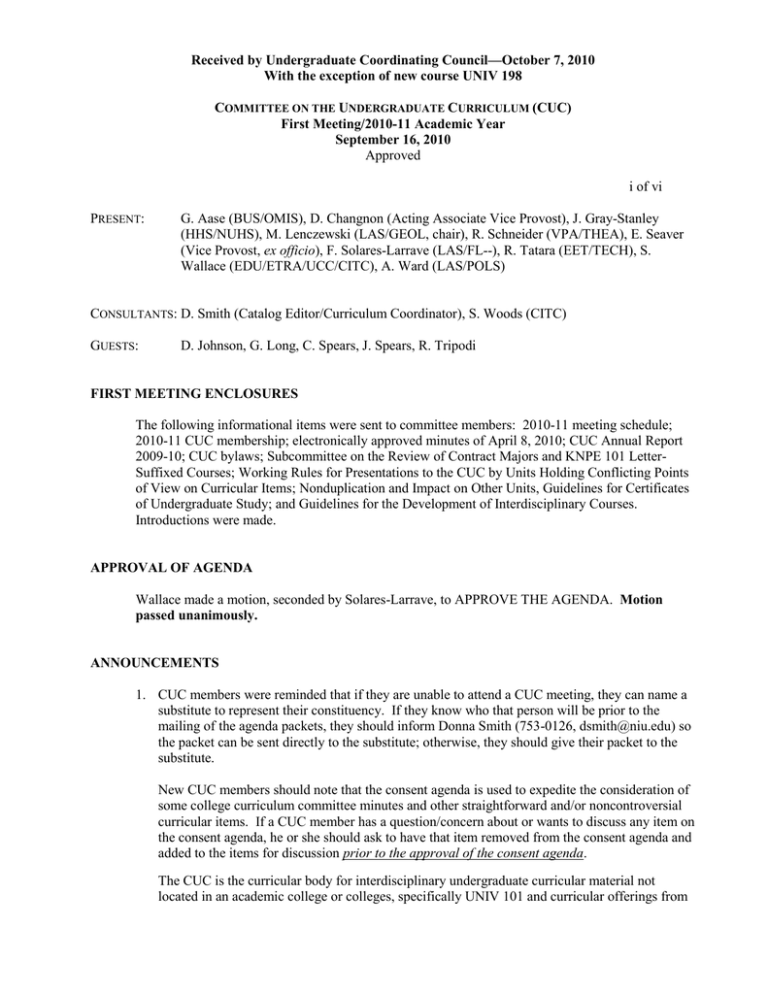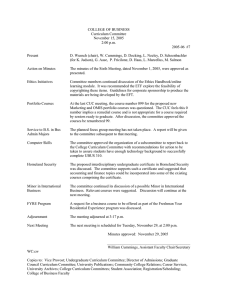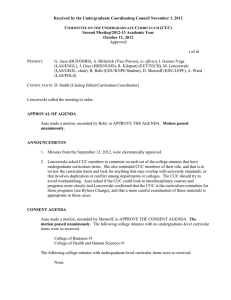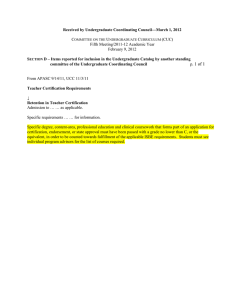Document 15173567
advertisement

Received by Undergraduate Coordinating Council—October 7, 2010 With the exception of new course UNIV 198 COMMITTEE ON THE UNDERGRADUATE CURRICULUM (CUC) First Meeting/2010-11 Academic Year September 16, 2010 Approved i of vi PRESENT: G. Aase (BUS/OMIS), D. Changnon (Acting Associate Vice Provost), J. Gray-Stanley (HHS/NUHS), M. Lenczewski (LAS/GEOL, chair), R. Schneider (VPA/THEA), E. Seaver (Vice Provost, ex officio), F. Solares-Larrave (LAS/FL--), R. Tatara (EET/TECH), S. Wallace (EDU/ETRA/UCC/CITC), A. Ward (LAS/POLS) CONSULTANTS: D. Smith (Catalog Editor/Curriculum Coordinator), S. Woods (CITC) GUESTS: D. Johnson, G. Long, C. Spears, J. Spears, R. Tripodi FIRST MEETING ENCLOSURES The following informational items were sent to committee members: 2010-11 meeting schedule; 2010-11 CUC membership; electronically approved minutes of April 8, 2010; CUC Annual Report 2009-10; CUC bylaws; Subcommittee on the Review of Contract Majors and KNPE 101 LetterSuffixed Courses; Working Rules for Presentations to the CUC by Units Holding Conflicting Points of View on Curricular Items; Nonduplication and Impact on Other Units, Guidelines for Certificates of Undergraduate Study; and Guidelines for the Development of Interdisciplinary Courses. Introductions were made. APPROVAL OF AGENDA Wallace made a motion, seconded by Solares-Larrave, to APPROVE THE AGENDA. Motion passed unanimously. ANNOUNCEMENTS 1. CUC members were reminded that if they are unable to attend a CUC meeting, they can name a substitute to represent their constituency. If they know who that person will be prior to the mailing of the agenda packets, they should inform Donna Smith (753-0126, dsmith@niu.edu) so the packet can be sent directly to the substitute; otherwise, they should give their packet to the substitute. New CUC members should note that the consent agenda is used to expedite the consideration of some college curriculum committee minutes and other straightforward and/or noncontroversial curricular items. If a CUC member has a question/concern about or wants to discuss any item on the consent agenda, he or she should ask to have that item removed from the consent agenda and added to the items for discussion prior to the approval of the consent agenda. The CUC is the curricular body for interdisciplinary undergraduate curricular material not located in an academic college or colleges, specifically UNIV 101 and curricular offerings from Received by Undergraduate Coordinating Council—October 7, 2010 With the exception of new course UNIV 198 COMMITTEE ON THE UNDERGRADUATE CURRICULUM (CUC) First Meeting/2010-11 Academic Year September 16, 2010 Approved ii of vi the Division of International Programs and the Center for Black Studies. This responsibility includes usual curricular activity (new, revised, and deleted courses as well as other catalog changes), general education submissions/resubmissions, and review of these units’ overall curricular offerings. 2. Items previously in Section B, now reported for inclusion in the catalog (Section C). 3. Items reported for inclusion in the catalog by another standing committee of the UCC (Section D). 4. Reorganization in the Vice Provost’s Office. Seaver explained that with the retirement of Harold Kafer, Provost Alden has asked Seaver to take on more of the strategic plan work. So Dave Changnon was hired as an acting associate vice provost to relieve Seaver of some of his other duties, including the committee work. Changnon will be attending the Undergraduate Coordinating Council (UCC) and all the committees that report to the UCC, among other duties. CONSENT AGENDA It was noted that college minutes with no controversial items are included in the consent agenda. Aase made a motion, seconded by Solares-Larrave, to RECEIVE THE COLLEGE MINUTES WITH NO UNDERGRADUATE CURRICULAR ITEMS. The motion passed unanimously. The following college minutes with no undergraduate-level curricular items were so received. College of Business #16 (AY 09-10) College of Education #10 (AY 09-10) College of Education #12 (AY 09-10) Aase made a motion, seconded by Schneider, RECEIVE THE COLLEGE MINUTES WITH UNDERGRADUATE CURRICULAR ITEMS. The motion passed unanimously. The following college minutes with undergraduate-level curricular items were so received. College of Business #17 (AY 09-10) College of Engineering and Engineering Technology #11 (AY 09-10) College of Health and Human Sciences #11 (AY 09-10) College of Health and Human Sciences #12 (AY 09-10) COLLEGE MINUTES AND OTHER CURRICULAR ITEMS FOR DISCUSSION College of Business, #15 (AY 09-10) In these minutes is new course MGMT 417 and revisions to the B.S. in management. Seaver pointed out their nonduplication statement and wondered if nothing in Leadership, Educational Psychology, and Foundations would apply. Wallace didn’t think they had any courses that were duplicates. Schneider Received by Undergraduate Coordinating Council—October 7, 2010 With the exception of new course UNIV 198 COMMITTEE ON THE UNDERGRADUATE CURRICULUM (CUC) First Meeting/2010-11 Academic Year September 16, 2010 Approved iii of vi commented that the term “change” is very broad. Aase responded that in this instance change refers to organizational resistance to changes in business organizations. Aase made a motion to RECEIVE THE UNDERGRADUATE CURRICULAR ITEMS IN BUSINESS #15 (3/30/10). Pending no second, there was further discussion. Seaver pointed out the responsibilities of the CUC in the bylaws and that the CUC reports curricular actions to the UCC without comment unless they involve course duplication or overlap between colleges, cross-college concerns, or university standards. Schneider pointed out that making the catalog clear and meaningful is of concern to the university. Aase responded that students cannot get to this particular course if they aren’t a business major and the course description would be meaningful to them. Schneider seconded the motion. Motion passed unanimously. College of Education #11 (AY 09-10) Among the undergraduate items in these minutes is new course TLSE 465. It is also marked for CITC approval. Seaver reported that CITC decided to use the CUC to deal with CITC related curricular items and will have a CITC representative attending the meetings as an observer. It was noted that Woods was attending for CITC chair-elect J.D. Bowers due to a scheduling conflict. But since Wallace is a member of CITC and is already attending CUC meetings, it was decided that he could be the CITC observer. Tatara asked about the term “RtI” in the rationale. Wallace responded that it stands for Response to Intervention. It is to ensure that every student meets the goals set out for the teacher and, if not, what will be the response. Wallace made a motion, seconded by Gray-Stanley, to RECEIVE THE UNDERGRADUATE CURRICULAR ITEMS IN EDUCATION MINUTES #11 (3/23/10). Motion passed unanimously. College of Engineering and Engineering Technolgy #10 (AY 09-10) There are several issues in these minutes. The main concern is that the college is adding courses to a program that are outside of the college without providing the documentation regarding the availability of those courses. Seaver noted that the COMS, ECON, and PSYC courses are very hard to get into, therefore this would limit the choices engineering students have for their electives and/or would lengthen the time it would take to complete their degrees. Lenczewski pointed out that many of these courses should not be listed as technical electives. The CUC also discussed developing a policy for colleges to check on capacity of courses they may be considering from outside their own colleges. Wallace added that the College of Education has a form they use to notify other colleges when they are deleting one of their courses from a program and the form could easily be used when one college is adding courses from another. He provided Smith with a copy of the form and Smith will get this issue on the agenda for the curricular deans. Schneider also suggested a wording change for the revision to ELE 429: “… including safety and cost effectiveness, as well as and must employ.” Tatara pointed out the minor in sustainable engineering, under technical elective courses, it should read “(5-6)” and “select 2 courses.” [Note: The CUC approved the minor in sustainable engineering on 2/11/10 pending the above clarifications, which the college did clarify.] Aase Received by Undergraduate Coordinating Council—October 7, 2010 With the exception of new course UNIV 198 COMMITTEE ON THE UNDERGRADUATE CURRICULUM (CUC) First Meeting/2010-11 Academic Year September 16, 2010 Approved iv of vi made a motion, seconded by Scheider, to TABLE COLLEGE OF ENGINEEIRNG AND ENGINEERING TECHNOLOGY #10 (2/25/10) PENDING CLARIFICATION OF THE ISSUES LISTED. Motion passed unanimously. OLD BUSINESS EET #6. CEET #10 from above replaces this time so it can be removed from the agenda. NEW BUSINESS 1. Service Learning Courses—Julia Spears. Spears reported that the proposal before the CUC came out of the Strategic Plan Curricular Innovations Task Force and is the product of a committee she has been working with. The proposal includes a consolidated definition of service learning that can be used across campus, rationale, course models and key components in a service learning course, and how faculty can respond. This will serve to enhance involvement of student in service learning activities. Her intent is to formalize through the curricular process two things. The first is to agree on a definition; what does service learning mean, what are the level of standards, etc. There will be a website that will help clarify service learning for the NIU community and will include a database of service learning opportunities. The second part of the proposal is to identify service learning courses. The proposal lists five elements that should be present in a course to enable it to be identified as having service learning components. Those elements are: provide meaningful engagement with the community, make connections between service learning and course material, require a minimum of 20 service hours per course, careful integration of service activities into the course, and understand and use reflection activities as rigorous teaching and learning strategy. Spears also proposed a process for identifying courses, either as new course proposals or for existing courses, and how to track service learning courses in Registration and Records. Seaver added that from the CUC’s perspective, there will be a process for identifying if a new course has a service learning component. The CUC will also be seeing a similar proposal in the coming months regarding distance education. Lenczewski asked if this would be a process where a course is so identified each semester and Spears responded that her office could monitor that each semester. It is Spears’s hope to work within the current system to identify courses. Wallace asked about the checklist for the courses and how civic learning is defined and Spears responded that it’s part of the service learning definition, “organized service activity that meets identified community needs.” She added, however, that faculty need to define what civic engagement and service learning mean within their disciplines. Discussion followed to further clarify definitions and the process for identifying the courses in MyNIU each semester. Aase asked what is the benefit to the university, what should CUC members tell faculty so they’ll want to get involved. Seaver responded that one of the visions of the university that came out of the Strategic Plan was that NIU is an engaged university. This proposal is a way to further define engaged activities and courses at NIU and it’s important for attracting students. It’s also a way to document to the Carnegie Foundation that NIU is doing service learning. Received by Undergraduate Coordinating Council—October 7, 2010 With the exception of new course UNIV 198 COMMITTEE ON THE UNDERGRADUATE CURRICULUM (CUC) First Meeting/2010-11 Academic Year September 16, 2010 Approved v of vi 2. Course proposal from the Office of the Vice Provost—Julia Spears. Spears explained that the proposed course, UNIV 198, Topics in Academic Success and Student Leadership, is also a product of the Strategic Plan as well as the need to have an anchor course for the Themed Learning Communities (TLC). The two TLCs being offered this semester are using UNIV 101, but it became apparent that the content in UNIV 101 shouldn’t be altered to fit the TLCs. The new course will be a variable credit topics course, which can be used by many areas such as Office for Academic Advising Center, Intercollegiate Athletics, and Student Academic Success. It was clarified for CUC members that the CUC is the curriculum committee for interdisciplinary courses such as UNIV 198. Aase made a motion, seconded by Solares-Larrave, to APPROVE NEW COURSE UNIV 198. Wallace asked what was the official course outline and Spears noted that it is included in the course proposal. Motion passed unanimously. 3. Baccalaureate Review Task Force Report—Greg Long—walk-in item. Long provided the background of the process. One issue that came out of the strategic plan was the need to reform the general education program. A team from NIU then attended an AAC&U workshop in the summer of 2008, and it became apparent that the general education goals could not be revised until the baccalaureate goals were revised. A steering committee and task force was formed and during the 2008-09 academic year input was received from over 1000 participants through several avenues (e.g. focus groups and surveys). During the summer of 2009, the responses were evaluated and the result was three main goals: communication, context, and critical thinking. More feedback was solicited and those goals were amended to: communication, creativity, and critical thinking. Context will be addressed in each of the different program areas. In Spring, 2010, goal development teams met and developed over 60 learning outcomes for the goals. The steering committee then refined those into the document provided to the CUC. Long pointed out the purpose statement on page 1 and the goal definitions on page 2. He is also asking CUC members take the proposal back to their colleges then for CUC’s approval of the entire document at the October 14 CUC meeting. Discussion followed regarding the language. Long noted that the task force struggled with keeping the goals simple versus too academic. He asked for input if CUC members thought there was a clearer way to state things. He added that the outcomes are purposely broad-based so they could be applied to many areas across campus such as student affairs, general education, and major programs. Wallace asked if there would be examples and Long stated that specific examples would be developed at the next level, once the general goals are approved. The General Education Committee will also get involved at that level to look at the general education goals using the new baccalaureate goals as the foundation. OTHER BUSINESS 1. Print Catalogs. Lenczewski asked if the CUC members could all receive their own print copy of the 2010-11 undergraduate catalog. Changnon will make sure the CUC members get one before the next meeting. Received by Undergraduate Coordinating Council—October 7, 2010 With the exception of new course UNIV 198 COMMITTEE ON THE UNDERGRADUATE CURRICULUM (CUC) First Meeting/2010-11 Academic Year September 16, 2010 Approved vi of vi 2. Double majors/degrees/majors and minors. The issue of using one course to fulfill the requirements for more than one degree was discussed last year, with no conclusion. The CUC will continue to look at developing a policy that defines how many hours are needed for a second major or degree, as well as the minimum number of hours required for a minor. Wallace added that this is timely in light of new ISBE standards for teacher certification where courses have to be identified as either general education or professional courses; they can’t be both. Changnon stated he would have his graduate assistant look at the MAC schools and other peer institutions to see what their policies are on this issue. CUC members discussed if it is their role to further discuss these issues. Smith read from the bylaws that the CUC can “recommend general policies regarding the design of the undergraduate curriculum.” Aase also noted that the template for designing certificates of undergraduate and graduate study is outdated. 3. Course revision versus new course. Aase observed that every year, with new members joining the CUC, course revisions seem to be handled differently, for example, if a department is proposing both title and description change, should it be considered a new course. Smith read the section of the APPM dealing with course revisions: “Course Revisions 1. When implementing a course revision the initiating department (or college) should provide a supporting statement explaining the need for the change. 2. Courses that keep the same or similar title but whose course description bears little conceptual resemblance to the original course will be treated as new courses. 3. A course revision may affect one or more of the following: a. course number. b. course description (editorial changes), to clarify, abbreviate, or expand current descriptions (but not to expand course content so much as to warrant a new course proposal), or to incorporate recent developments or shifts of focus in a topic area. c. course title to conform to changing terminology within the discipline, or to reflect a change in course description, but with due sensitivity to cultural issues; d. number of credit hours that may be earned; e. prerequisite/corequisite to encourage adequate student preparation or optimal program sequencing, or as necessitated by changes in other courses.” It was noted that the CUC could make a ruling on a course revision if the description was being changed too much. The meeting was adjourned at 2:20 p.m. The next meeting will be October 14, 2010, 12:30, Altgeld 225. Respectfully submitted, Donna M. Smith


